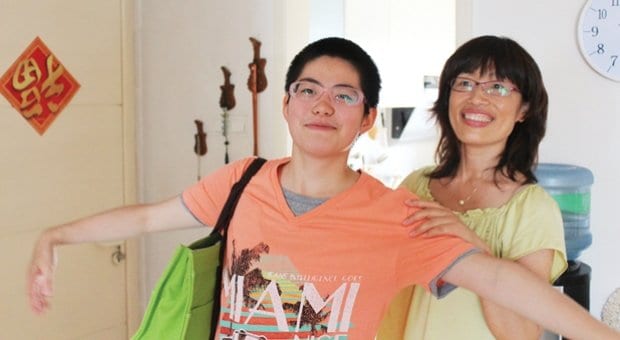International gay news can be depressing. Activists die in Cameroon, parades are banned in Russia, families are torn apart in India. Progress limps along, but the list of countries less fortunate than our own is long. When we sit down to watch a documentary about a distant gay community, we often brace ourselves for stories of grim repression.
Fan Popo’s new documentary, Mama Rainbow (), is an antidote to all that. The film is one big, warm, fuzzy, optimistic hug to restore your faith in human beings (and remind you to call your mother).
Mama Rainbow’s six chapters each examine a Chinese mother and her adult gay child in a mainland Chinese city. We spend most of the film just watching the two generations interact, by turns talking to the camera or each other or rambling through daily life.
If you can handle the subtitles, the minimalist interview format, the scattered editing and the lack of any real narrative, the pure adorableness of this film is well worth the 80 minutes. These mothers love their children with a breathtakingly forthright intensity. They are advocates, protectors, cheerleaders, confidants and best friends.
The beauty of Mama Rainbow lies in the moments of mundane affection between mother and child. The mothers of Mama Rainbow approach their children’s sexuality with a compassion and practicality that should be an inspiration to parents in the most progressive countries.
Sometimes these moments are quietly hilarious, such as mother Meiyi remembering the feeling of dawning realization when her neighbours asked why her daughter and her daughter’s best friend slept in the same bed.
“No, it’s nothing,” she told them. “We only have the one bed!”
Others are poignant. Mother Zhang explains what happened when her son told her he is gay. “This is a very hard road you’re on,” she told him. “Do you know that?”
“Yes,” he replied.
“Good,” she said. “Now go to bed.”
Chinese anti-gay sentiment is most often born out of ignorance, not ideology, malice or religion. Some people interviewed on the street in the film call gay love “disgusting” and “unacceptable,” but nobody calls upon some higher moral authority to condemn it. Given a little push, they are often swayed to accept gay people — in China, sexuality is a personal issue, a family issue, and not a question of larger moral standards.
And that is the reminder Mama Rainbow gives to gay activists in all countries. Homophobia can crumble against the practicality of familial love.
In one awkward but powerful scene, a young lesbian activist walks around a busy city square in Nanning, introducing people to her mother. “I’m actually a lesbian myself,” she tells them. “And this is my mother. She supports me.”
What can anyone say to that?
Mama Rainbow
Mon, Aug 19, 6pm
Vancity Theatre and Atrium
1181 Seymour St


 Why you can trust Xtra
Why you can trust Xtra


